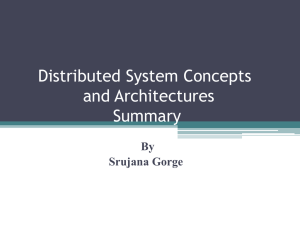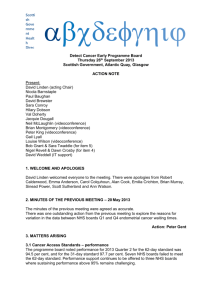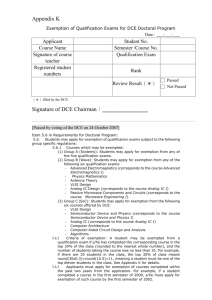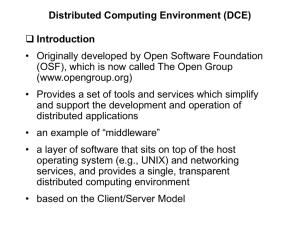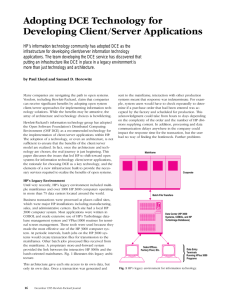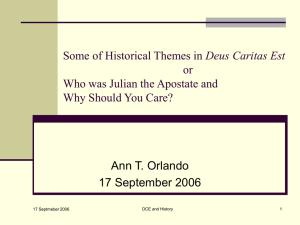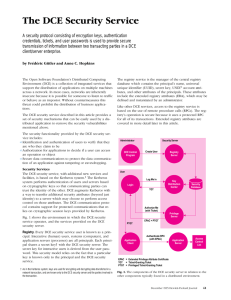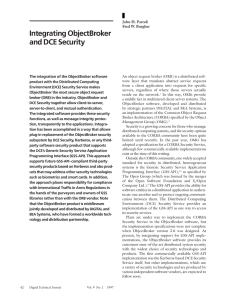Massachusetts Community College Council
advertisement
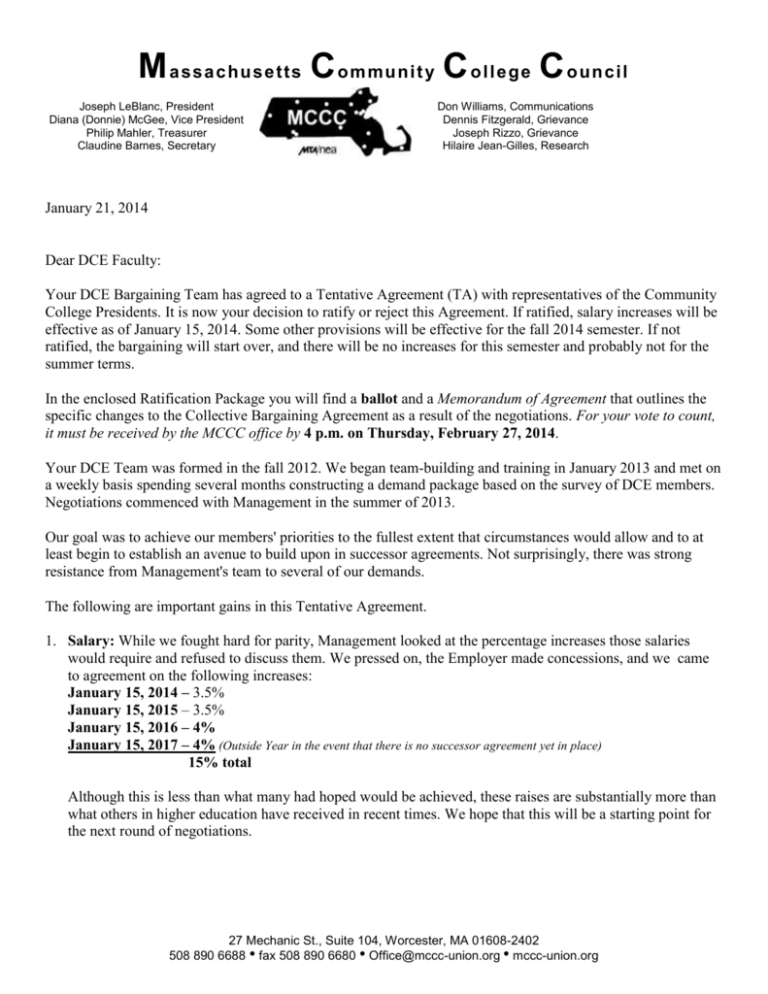
M a s s a c hu s e t t s C om m u ni t y C o l l e ge C o un c i l Joseph LeBlanc, President Diana (Donnie) McGee, Vice President Philip Mahler, Treasurer Claudine Barnes, Secretary Don Williams, Communications Dennis Fitzgerald, Grievance Joseph Rizzo, Grievance Hilaire Jean-Gilles, Research January 21, 2014 Dear DCE Faculty: Your DCE Bargaining Team has agreed to a Tentative Agreement (TA) with representatives of the Community College Presidents. It is now your decision to ratify or reject this Agreement. If ratified, salary increases will be effective as of January 15, 2014. Some other provisions will be effective for the fall 2014 semester. If not ratified, the bargaining will start over, and there will be no increases for this semester and probably not for the summer terms. In the enclosed Ratification Package you will find a ballot and a Memorandum of Agreement that outlines the specific changes to the Collective Bargaining Agreement as a result of the negotiations. For your vote to count, it must be received by the MCCC office by 4 p.m. on Thursday, February 27, 2014. Your DCE Team was formed in the fall 2012. We began team-building and training in January 2013 and met on a weekly basis spending several months constructing a demand package based on the survey of DCE members. Negotiations commenced with Management in the summer of 2013. Our goal was to achieve our members' priorities to the fullest extent that circumstances would allow and to at least begin to establish an avenue to build upon in successor agreements. Not surprisingly, there was strong resistance from Management's team to several of our demands. The following are important gains in this Tentative Agreement. 1. Salary: While we fought hard for parity, Management looked at the percentage increases those salaries would require and refused to discuss them. We pressed on, the Employer made concessions, and we came to agreement on the following increases: January 15, 2014 – 3.5% January 15, 2015 – 3.5% January 15, 2016 – 4% January 15, 2017 – 4% (Outside Year in the event that there is no successor agreement yet in place) 15% total Although this is less than what many had hoped would be achieved, these raises are substantially more than what others in higher education have received in recent times. We hope that this will be a starting point for the next round of negotiations. 27 Mechanic St., Suite 104, Worcester, MA 01608-2402 508 890 6688 • fax 508 890 6680 • Office@mccc-union.org • mccc-union.org 2. A Second Course: The right to a second course has been an important priority for many members, as well as a priority for MCCC Bargaining Teams over the years. The College Presidents have also made it clear that it is their right alone whether to grant additional assignments. However, this time there is some slight progress toward our objective. Those DCE faculty who have taught two or more courses for five years should anticipate that a second course will continue to be assigned, assuming that there are sufficient courses and that some other conditions are met. This is a first for the DCE unit. 3. Pay for Meetings and Training: We agreed that, other than the one unpaid required meeting a semester and the state-required online Ethics training, DCE faculty will be compensated for any additional required meetings or training as follows: $40 for each additional meeting or training and $75 for meetings or training in excess of 4 hours. This also is a first for the DCE unit. 4. Pay for Cancelled Courses: If a DCE member is assigned and has accepted a course that is cancelled within 7 calendar days before the start of that class, the member will receive $225 (the stipend is for prep work done in advance of the class; any additional cancelled sections of the same class are exempt from payment). This also is a first for the DCE unit. 5. Increased Ratio for Labs: The lab ratio salary increases from 66% to 74% of the applicable per credit salary step schedule. This applies to each lab hour and is independent of the actual college credit ascribed to the lab portion of the course. We feel this is steady improvement and long overdue. The early DCE contracts provided even less pay for lab time. 6. System-wide Salary Steps—Teaching at Multiple Colleges: For anyone teaching at more than one state community college in Massachusetts, this provision will allow the member to petition college(s) where the member is at a lower step to move to the highest step he or she has accrued. This is applicable to those who have no more than a 2-year break in teaching at the college with the highest attained step. This is also a first for our contract. 7. Parking Fee: A year's advance notice will be provided before instituting any parking fee, and the parties must impact bargain each attempt to institute or change parking fees. 8. Comprehensive Evaluation: New faculty will have a comprehensive evaluation prior to attaining reappointment rights. The Team felt that a fair evaluation would best ensure quality instruction and provide for a means of improving the effectiveness of our members. Normally, an evaluation proposal is made by the college administration, but it is important to note that this proposal came from the MCCC. At most colleges, it appears that there is little concern on the part of college officials about the quality of instruction until a complaint is lodged. The evaluation process is then used as a means of investigating complaints and often becomes punitive in nature. Your representatives felt that evaluation should be used for positive and constructive purposes and to demonstrate the effectiveness of DCE faculty. We hope that this will provide further foundation for more equitable treatment of part-time instructors. 9. Written Notices and Communication: Student evaluation results must be sent to faculty in a secure manner other than by email. This contract revision also makes it clearer as to what communications may be sent electronically. 10. Sexual Harassment Reporting Responsibilities: This provision clarifies the responsibilities of DCE faculty as abuse/harassment reporters. The new language provides that DCE faculty have no responsibility to investigate allegations. Their responsibility stops after a report of an incident is sent to the appropriate College official. 11. Streamlined Grievance Procedure: The steps of the grievance procedure are reduced from four to three and resembles closely the procedure found in the Day contract applicable to full time unit members. 12. Grievance Forms: These are updated and made clearer to users. For a relatively new-to-the-process group at the start of this grueling process, we feel we learned quickly about the negotiation process, what we could fight for, and what we had to let go. Current Team members are: Mark Bashour (Vice-Chair), Quinsigamond DeAnna Putnam (Secretary), Bunker Hill Linda Grochowalski (Chair), Quinsigamond Joe Rizzo (MCCC DCE Grievance Coordinator Gail Guarino, Cape Cod and Acting MTA Consultant), Northern Essex Tom Kearns, Massasoit Candace Shivers, Mt Wachusett Joe LeBlanc (MCCC President), Northern Essex Bob Whalen (MTA Consultant/Spokesperson). Donnie McGee (MCCC Vice President), Bristol Area Cluster Meetings are being scheduled at Bristol, Bunker Hill, Holyoke, North Shore, and Quinsigamond to give you an opportunity to ask questions before you vote on this agreement. The Team encourages you to attend one of these meetings—watch for announcements on dates and times. Your chapter may also request that Team members visit your campus for a Q & A session. Finally, while many had hoped for full time equivalency in salary, the salary increases are more than fair in comparison to the increases found in the contracts of other state employees or compared to part-time faculty teaching in community colleges nationally. The larger than average salary increases demonstrate some movement toward parity and in several areas other than per course salary. For these reasons, the Bargaining Team and the Board feel this is a strong contract and recommends a "yes" vote. In order to build on the wins the team achieved here, we strongly encourage all of you to become active at your colleges and in state-wide efforts to build the groundwork for action before the next contract cycle comes around. Contact your Chapter President or your campus Adjunct Representative for ways you can become more involved. You can find contact information on the MCCC website, as well as a copy of the complete Tentative Agreement, at www.mccc-union.org. Sincerely, Linda Grochowalski Linda Grochowalski, Chairperson DCE Negotiating Team Quinsigamond Community College
